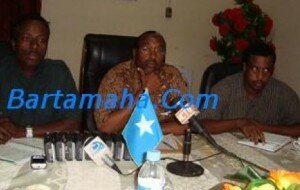Somalia’s parliament asks neighbors to send troops
 MOGADISHU, Somalia (AP) — Somali lawmakers pleaded Saturday for international military intervention within 24 hours to help fight Islamic insurgents in the lawless African nation, where fierce fighting has resumed in the capital.
MOGADISHU, Somalia (AP) — Somali lawmakers pleaded Saturday for international military intervention within 24 hours to help fight Islamic insurgents in the lawless African nation, where fierce fighting has resumed in the capital.
Parliament said in a resolution that it needed foreign countries to send troops immediately, Speaker Sheik Adam Mohamed Nor told journalists. He did not give details of the vote. President Sheik Sharif Sheik Ahmed, who is also a member of parliament, did not take part but it was not clear why.
“We have, as a parliament, decided to ask the regional governments — like Kenya, Ethiopia and Djibouti — as well as the international community to intervene militarily in Somalia within 24 hours to help the Somali nation,” Nor said.
There was no immediate indication whether Somalia’s neighbors would answer the Parliament’s plea for foreign troops. There is already an African Union force in Mogadishu, but its mandate is restricted to guarding government officials and installations.
Fierce battles between the insurgents and government troops since Friday have left at least 10 people dead in the capital, witnesses said, and led the Parliament to hold its session Saturday in the presidential palace rather than its usual venue in northern Mogadishu.
The Cabinet called on Saturday for the president to declare a state of emergency, though such a move would be unlikely to change much, as the weak government controls only a few blocks of the capital and a border town.
“The country is in danger. The humanitarian situation is at the worst level and the Somali soil and flag are in danger,” said Farhan Ali Mohamud, the information minister.
The United Nations says an estimated 3.2 million Somalis — almost half the country’s population — need food and other humanitarian aid.
A suicide attack Thursday in western Somalia killed the country’s national security minister and four other government officials. A hospital official there said late Friday that 35 more people had been killed in the attack, which the extremist Islamic group al-Shabab claimed. Somalia’s president had blamed al-Qaida.
Counterterrorism experts have long feared Somalia is a haven for the terror network, and the U.S. State Department considers al-Shabab a terrorist group with links to al-Qaida — which al-Shabab denies.
The United States, which in the past has launched air strikes targeting suspected al-Qaida members in Somalia, accuses al-Shabab of harboring terrorists who allegedly blew up U.S. embassies in Kenya and Tanzania in 1998.
A surge in violence in May, which diplomats said was a major push by the insurgents to force the government out of its Mogadishu strongholds, killed nearly 200 civilians. Nearly 126,000 people have fled their homes since May 7, according to the U.N. refugee agency. The violence in May went on for about two weeks, but despite reduced fighting, Mogadishu residents continue to flee their homes in anticipation of more conflict.
Two years ago, Ethiopia deployed troops to support Somalia’s fragile, Western-backed government, but they were widely unpopular and were finally withdrawn in January after the election President Sheik Sharif Sheik Ahmed.
Last month Ethiopia sent in troops to the border regions of Somalia.
Djibouti, Ethiopia and Kenya are members of the Intergovernmental Authority Development, a regional group that has led past peace talks on Somalia and last month imposed a sea and air blockade to stop supplies reaching the Islamic insurgents there. It is not clear whether the blockade is effective.
Somalia has not had an effective government since 1991, when warlords overthrew longtime dictator Mohamed Siad Barre and plunged the country into anarchy and chaos. The lawlessness also has allowed Somali pirates to flourish, making the nation the world’s worst piracy hotspot.
Comments
comments
 Calendar
Calendar






































